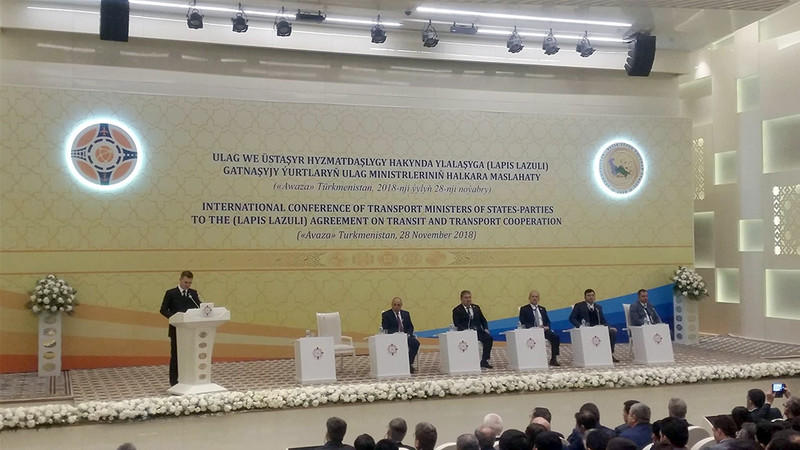Lapis Lazuli project on agenda in Turkmenistan [PHOTO]
![Lapis Lazuli project on agenda in Turkmenistan [PHOTO]](https://www.azernews.az/media/2018/11/28/20.jpg)
By Abdul Kerimkhanov
The International Conference of Ministers of Transport of the States Parties to the Agreement on Transit and Transport Cooperation (Lapis Lazuli) began its work in the Avaza National Tourist Zone in the city of Turkmenbashi on November 28.
Deputy Chairman of the Cabinet of Ministers of Turkmenistan M.Chakiyev, First Deputy Prime Minister of Azerbaijan Yagub Eyyubov, First Deputy Prime Minister of Uzbekistan Achilbai Ramatov, Minister of Transport and Infrastructure of Turkey Jahit Turhan, Minister of Transport of the Islamic Republic of Afghanistan Tahmasi Mohd Hamid and Deputy Minister of Economy and Sustainable Development of Georgia Akaki Sagirashvili participated in the event.
Among the key topics of the forum are the launch of test deliveries through the Lapis Lazuli transport corridor connecting the regions of Central and South Asia, the Caspian and Black Sea basins, the Mediterranean, coordination of tariffs for transportation along this route and other aspects of the project.
Speaking at a conference, Deputy Minister of Transport, Communications and High Technologies Elmir Velizade declared that investments in infrastructure projects will increase Azerbaijan’s GDP directly by 240 million manat, indirectly by 140 million manat, a total of 380 million manat, and also lead to the opening of 5,500 new jobs.
Also in the first part of the international conference, delegations discussed issues such as the role of interstate cooperation in the development of the international transport corridor Lápis-Lazuli and the importance of logistics companies in the development of transport corridors.
Afghanistan, Turkey, Turkmenistan, Azerbaijan and Georgia signed an agreement on the creation of the Lapis Lazuli transport corridor which is set to connect the five countries on November 15, 2017.
The trans-regional corridor will encompass mainly railways and highways, which will connect the city of Torghundi in the Afghan province of Herat with the port of Turkmenbashi on the shore of the Caspian Sea via Ashgabat.
From Turkmenbashi, goods will be able to travel further by ferry to Baku, where they would be placed on train cars and continue westward to Europe across the South Caucasus via the newly launched Baku-Tbilisi-Kars railway. Further, the corridor will pass through Tbilisi to Ankara with branches to Poti and Batumi, and, then, from Ankara to Istanbul.
Consultations on the creation of the transport corridor began back in 2012. The initiative seeks to improve transport infrastructure and procedures (including for road, rail, and sea), increase exports, and expand the economic opportunities of citizens in countries benefiting from this new transport corridor.
Barriers to regional trade and transit and transaction costs will be reduced, in part, through a new Custom Integration Procedure and, between Afghanistan and Turkmenistan, a new Cross-Border Transport Agreement. Its projected impact is considerable not only because most of the needed infrastructure is already in place, but also because most of the investment required will focus on improving policy and governance.
The name ‘Lapis Lazuli’ is derived from the historic route that Afghanistan’s lapis lazuli and other semiprecious stones were exported along, over 2,000 years ago, to the Caucasus, Russia, the Balkans, Europe, and North Africa.
---
Abdul Kerimkhanov is AzerNews’ staff journalist, follow him on Twitter: @AbdulKerim94
Follow us on Twitter @AzerNewsAz
Here we are to serve you with news right now. It does not cost much, but worth your attention.
Choose to support open, independent, quality journalism and subscribe on a monthly basis.
By subscribing to our online newspaper, you can have full digital access to all news, analysis, and much more.
You can also follow AzerNEWS on Twitter @AzerNewsAz or Facebook @AzerNewsNewspaper
Thank you!




